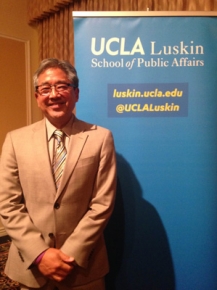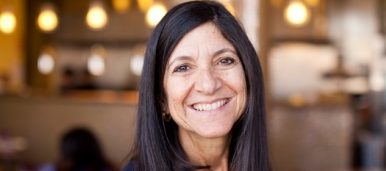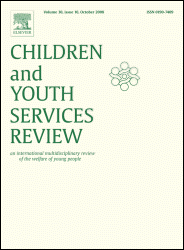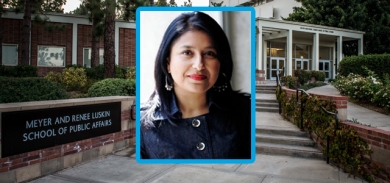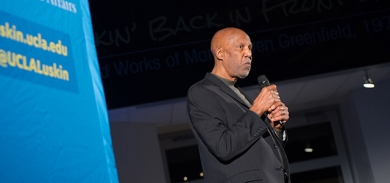Bohnett Fellows Make a Difference in L.A. Mayor’s Office UCLA Luskin's signature executive apprenticeship program provides on-the-job training and networking opportunities, including this visit to Washington, D.C.
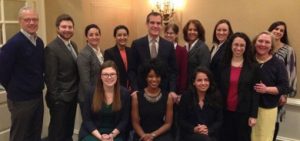
By Adeney Zo
UCLA Luskin Student Writer
From L.A. to D.C., students in the David Bohnett Fellowship program are making an impact wherever they go.
This fellowship program, sponsored by the David Bohnett Foundation, gives UCLA Luskin students the unique opportunity to work in the L.A. Mayor’s office.
UCLA Luskin was the first of three schools across the nation to offer the Bohnett Fellowship, followed by the Wagner School of Public Service at New York University and the University of Michigan’s Gerald R. Ford School of Public Policy. Since its inception in 2006, fellows have had the chance to apply their studies to local issues, from homelessness to transportation alternatives.
Second-year Social Welfare master’s student Skylar Lenox had the opportunity to form and implement the Mayor’s Volunteer Corps, a group meant to “connect Angelenos with high impact volunteer opportunities . . . with Mayor Garcetti’s vision. It’s about finding opportunities that are high impact and meaningful,” said Lenox.
Kelsey Jessup, a second-year Public Policy student, was already interning at the Mayor’s office when she was accepted into the program, but the fellowship opened the doors to new opportunities within the office.
“Even as an intern they treat you as part of the staff . . . but with the fellowship expectations rose,” said Jessup. “I was there full time, doing bigger projects and more pressing things for the office.”
Jessup works in the Performance Management and Budget & Innovation department. At the start of her fellowship, Jessup became involved in one of the largest projects at the mayor’s office. “When Mayor Garcetti came to office in 2013, he took the role of CEO and planned to interview and evaluate all general managers of the city departments,” Jessup said. “I worked with my team on the analysis, and it was a great opportunity to learn about all the departments.”
Beyond working locally, however, fellows had the opportunity to travel and speak with students and policymakers across America.
In October, Bohnett Fellows from three different cities converged in Detroit to discuss how policy changed and revitalized Michigan’s most populous city. A group of UCLA Bohnett fellows also attended the U.S. Conference of Mayors in Washington, D.C., an annual event for mayors to discuss policy issues. The program was featured in Governing magazine.
“The conference allowed me to get out of academia and in the practical world,” Lenox said. “It has been the link between theory and practice, which allowed me to better get into the mindset of a practitioner.
“I learned what it means to be a leader in your city and evaluate policy in a way that brings in not just [the] ideal,” she said.
The conference allowed for Bohnett fellows to witness the perspectives and ideas of mayors in different areas of the U.S., and facing different challenges, coming together in a cohesive discussion.
“My biggest takeaway was that I felt inspired by what people across the nation are doing. Just being around all these mayors who want to collaborate and serve the public is inspiring,” Jessup said. “It makes me proud to work in a city that’s part of that movement.”
Both Lenox and Jessup will be finishing their work at the Mayor’s Office this year, but their future in policy and social work is just beginning.
Jessup, who studied theater as a UCLA undergraduate and worked in a variety of fields, views the fellowship as a window of opportunity for a career in public policy. “I’m learning skills, but without the experience of the fellowship I would have had a much harder time getting work experience on the field,” said Jessup. “It’s given me the foot in the door that I really didn’t know how I was going to get.”
Lenox is equally optimistic about the path she will take following the end of the fellowship and her studies at UCLA Luskin. “The fellowship is not just funding our education – they are really invested in us as leaders and future change makers,” said Lenox. “I really see social work as one of the most powerful disciplines you can be trained in for creating positive social change and being a service to others.”
VC Powe, executive director of External Programs, has overseen the program since its inception. She says the proof of the program’s promise is that all the graduates of the fellowship have secured full-time jobs in public service fairly quickly after graduation.
More information about the Bohnett Fellowship, including application information for UCLA Luskin students, can be found on the program website.
